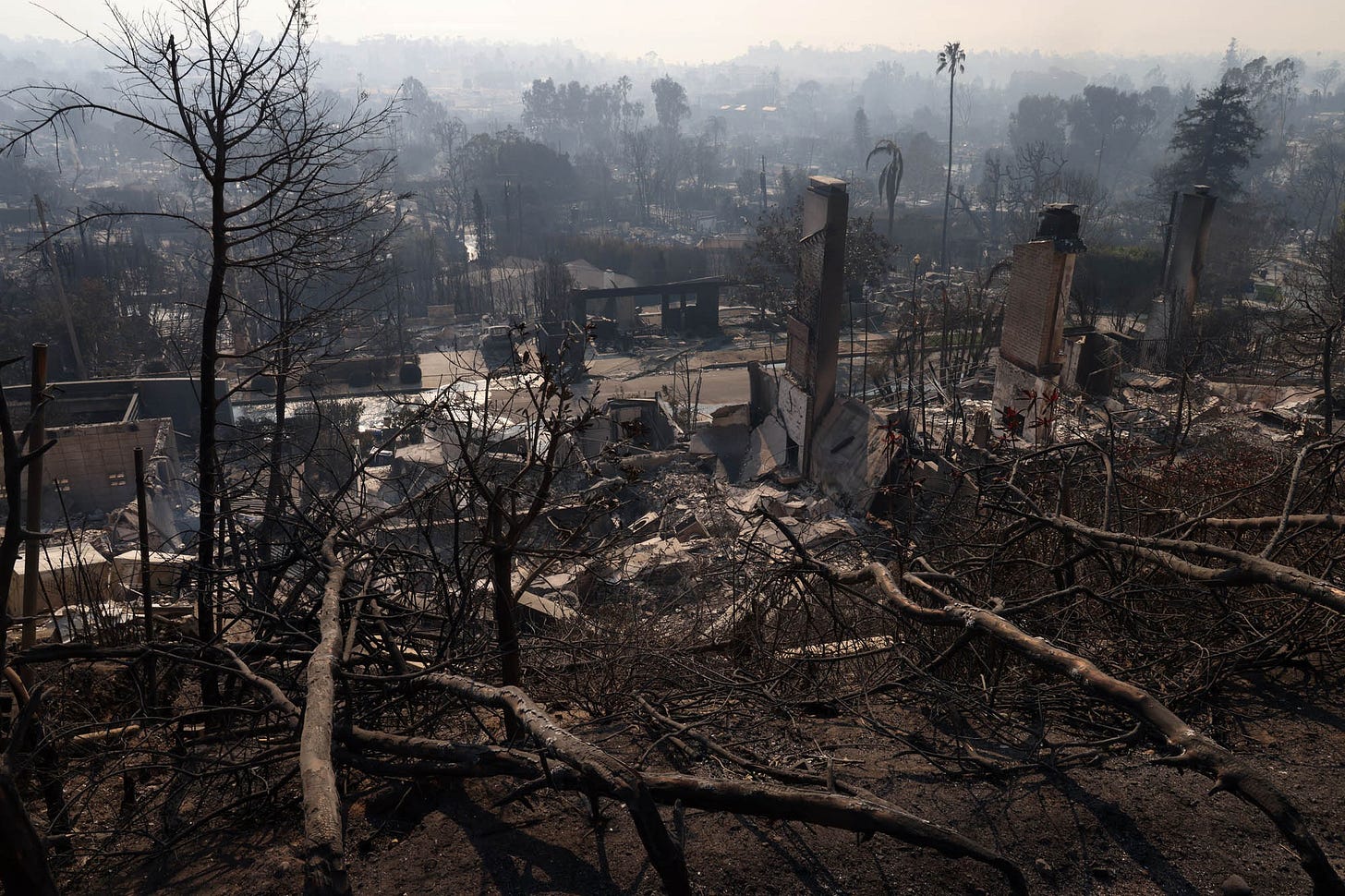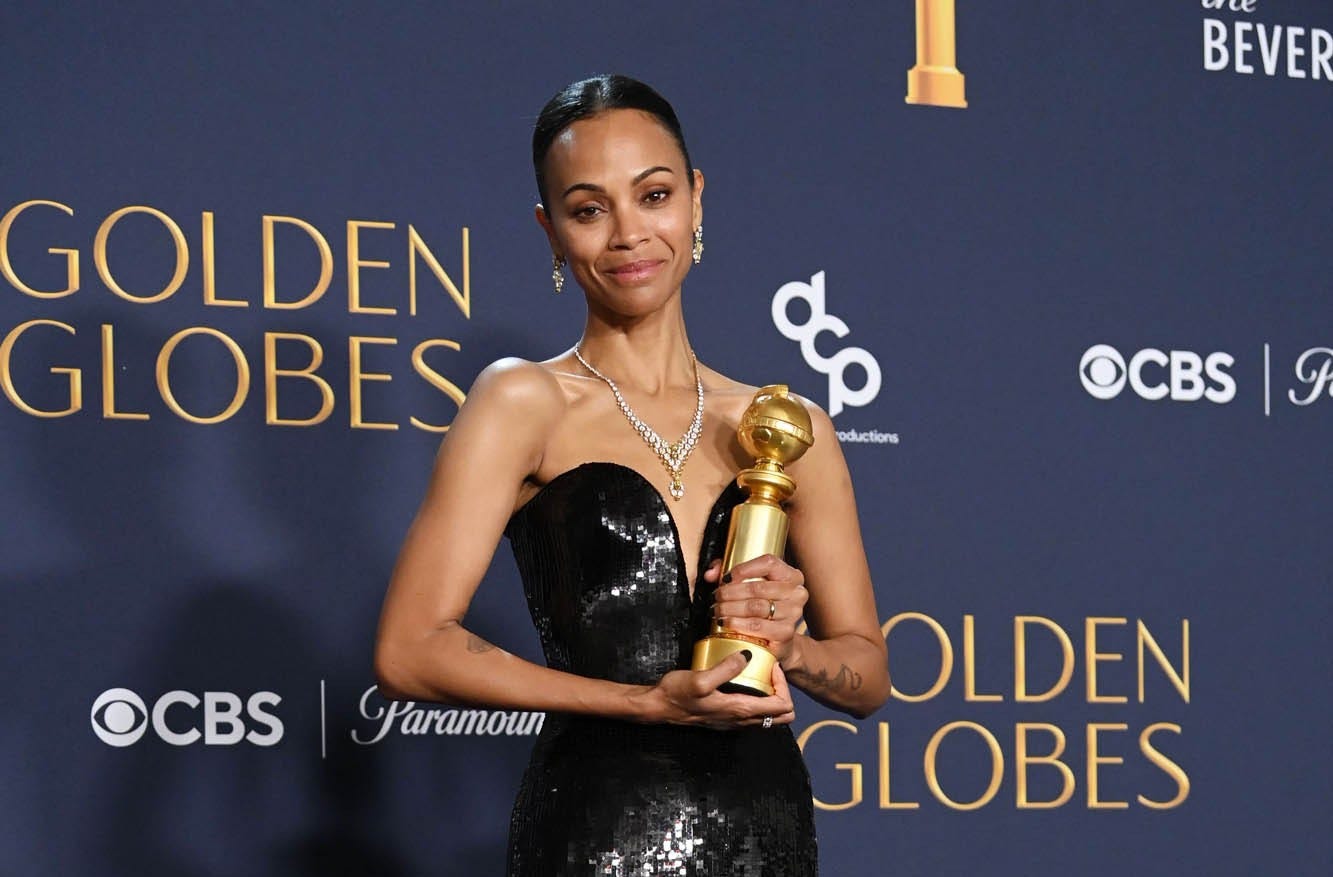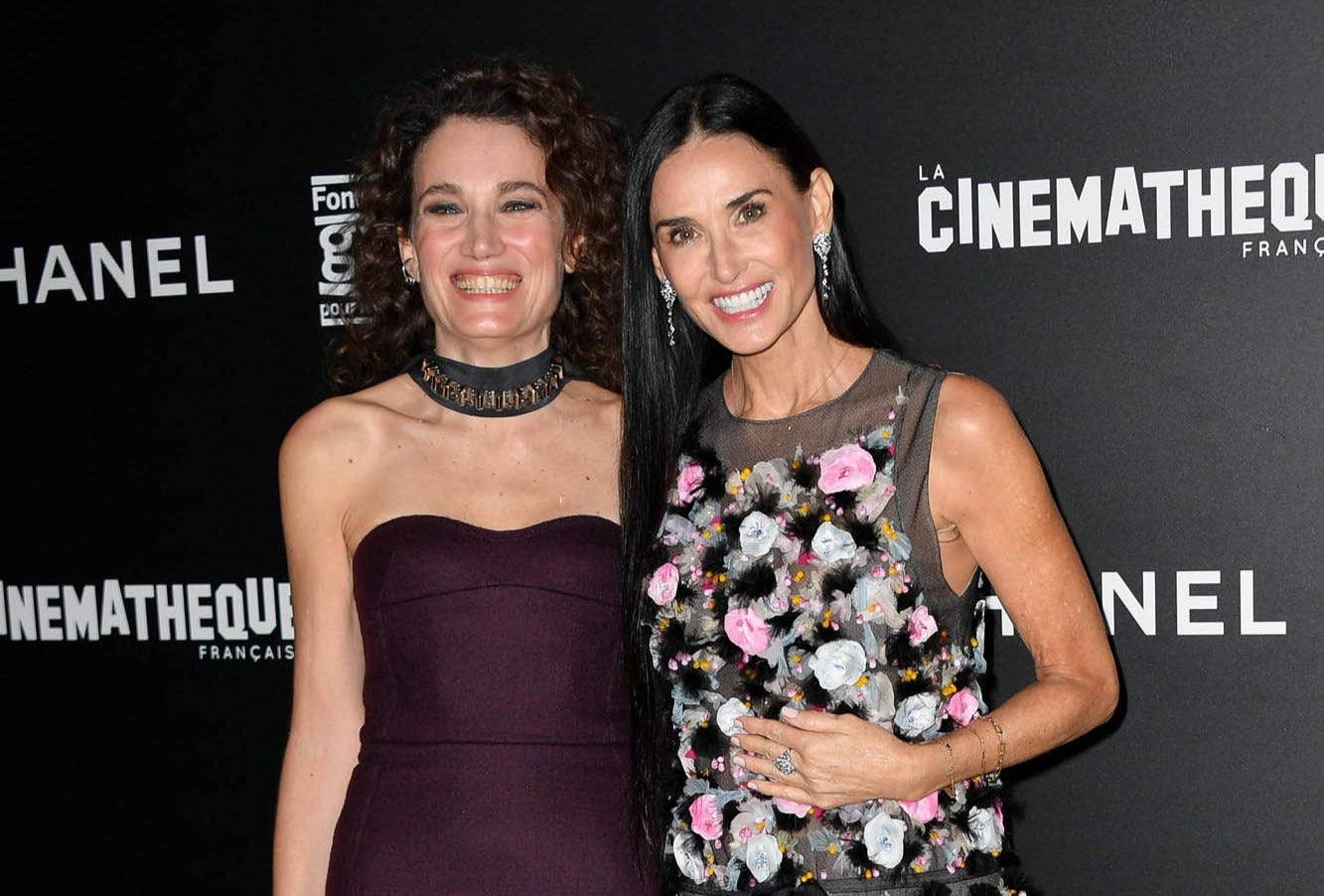Mailbag for January 10, 2025
Industry impacts of the LA fires, why is Meghan Markle taking heat over cooking when others aren't, how much award show speeches matter, how to recognize good directing, and more

Dear Squawkers,
It’s our first mailbag of the year after a really shitty week at the geographical nucleus of what’s brought us together at The Squawk. Our common link is celebrity gossip, and Hollywood is where so much of it is generated. Hollywood is on fire and there will be serious consequences. As I wrote on the main site earlier in Thursday’s open, it’s not parties and award shows, it’s about the fact that so much of Los Angeles is powered by the entertainment industry – the ecosystem orbits around celebrities, yes, but there hundreds of thousands of people, maybe more, whose names we’ll never know, who depend on the industry for their own livelihood.
As of now, several television series have been paused and it is unclear when shooting will resume. The issue isn’t about missing out on our TV shows but about crews who can’t work and the double or triple whammy of not having anywhere to live and, possibly, not getting paid. Then, of course, there’s the snowball effect of delayed productions and what that might mean for the networks; networks are corporations, they are soulless and losing production days means money and those fuckers will always try to make up for those losses somewhere by cutting something later down the line.

Hollywood has still been trying to rebound since the strikes and the strikes happened just when Hollywood was rebounding from COVID. We’ve posted often about the viability of the theatrical business, how volatile it’s been for movies with inconsistent and unpredictable box office returns. Los Angeles is one of America’s biggest movie markets. No one is going to movies right now. Movie production schedules are also being thrown into chaos because it’s not safe to film, resulting in further expense, further delays, more concerns about the pipeline and the impact that will have on everyone from actors to writers to producers to camera operators and entire production teams. Remember that fight over the push for A.I.? Don’t think for a second that greedy corporations won’t somehow, and sneakily, use this as a convenient excuse to accelerate their desire to replace human labour.
Just a few bummer thoughts going through my mind as we continue to hope that firefighters and first responders can get the situation under control.
Let’s get to the mailbag.
Question from Zoe in the Meghan Markle chat this week:
Here is a little thought experiment: Recently Stephen Colbert and his wife published a cookbook. I don’t see anyone criticizing them for publishing a cookbook when they are not trained chefs with 20 years experience! Stephen Colbert already makes a lot of money as a late night talk show host. They don’t need money! Why should they get a cookbook when there must be thousands of talented chefs toiling in obscurity for very little pay? The cookbook they made does not offer any original ideas. I’m sure Martha Stewart has done it in the past and done it better. How boring, etc. See how the same arguments can be made against any celebrity, but it seems Meghan always gets the worse treatment. Why is that?
Lainey’s Answer:
Thank you for this, Zoe. Your point is excellent, and I love this thought experiment and here’s where my mind went when I read your comment. By the way, for those of you who weren’t checking in on that thread – it was in response to Maria’s post on Tuesday about Meghan’s return to Instagram and the trailer for her upcoming Netflix series, With Love, Meghan. As Maria wrote, and always writes when she covers Meghan, it is impossible for the internet to be normal about her. We know what’s out there, we know how unfairly she’s been treated.
What Zoe is specifically referring to is Maria’s point about Meghan’s lack of experience in food. And thus, the comparison to Colbert and the cookbook. So…back to the thought experiment – for me, the reference to Colbert’s book made me think of Meghan’s children’s book, The Bench. She had no experience in that field either and when I reported on it, this wasn’t relevant. It was an original story, hers to tell.
As Zoe mentioned, Colbert’s cookbook has no original ideas, at least no original food ideas. But that’s not the only selling feature for the book. Does This Taste Funny? isn’t a conventional cookbook, it’s also a food memoir. Stephen and Evie are sharing recipes alongside anecdotes about their lives together, and their family, what they eat when their friends come over – maybe Jon Stewart and/or Steve Carrell. That’s where the originality comes in. And there’s the added factor of familiarity, particularly over the last few years.
Remember, the Colbert audience became quite acquainted with Evie during COVID when he was filming from home, and she was literally directing and producing him and appearing on camera. For regular viewers of The Late Show, Evie became kind of like a co-host, or Gelman (if you remember from way back in the Regis Philbin days), or even Guillermo for Kimmel. At least during that time. So they’d established a certain…performance… as a couple. Which is why the book has another element to it that makes it more than just a cookbook – as Bon Appetit said, it’s also “a master class in couples therapy”. Those are the layers of added value to the Colbert book.
So to go back to Meghan, the added value because she’s entering a space where she has no formal experience like Colbert, will be what story she’s going to tell that sets it apart, the way the Colberts set their book apart – by opening up their personal lives, by leaning into the joint public personality they’d already built as a couple.
And the reason it’ll be that much more challenging for Meghan – over and above Zoe’s very good point about how Meghan is held to a different standard (totally agree, I hope we’ve made that clear) – is that a cookbook in black and white text with some still photos is an entirely different medium from television. So much more intimate, personal, tangible. Television is parasocial in a way a cookbook could never, ever be. Which makes the stakes that much higher. When the story is delivered visually, the reactions are that much more visceral, this is how our brains work.
Lifestyle television is an artform. Just like sports documentaries are an artform. Prince Harry just tried it with Polo, and it was, as I wrote in my column here at The Squawk a few weeks ago, kind of a flop in comparison to the whole library of sports docs out there, not just on Netflix but across all networks. Meghan is entering into a saturated space – some might even say an oversaturated space. After all, there are multiple networks dedicated solely to lifestyle and all its streams, from home renos to gardening to antiquing and, yes, entertaining and cooking. In this business, it’s standard, for anyone doing any show, to compare and benchmark.
Meghan is a proper celebrity (and, really, there’s no debate about this now, she’s about to launch a lifestyle TV show) and we should be able to analyse her work the way we analyse other celebrities’ work. As Maria has noted, though, because there’s so much fuckshit out there about her from people who are just determined to hate her, regardless, it’s difficult to make fair and thoughtful criticisms without having it get lumped in with all the rest of the junk. As a site, this is what we have to balance: how to assess her the way we’ve assessed her celebrity cohort while not contributing to the toxicity that follows her. But also, how to not infantalise her either. Because she’s a producer, she’s a creative with her own production company, she’s ambitious, she’s making boss moves. And pardon the corny pun, but if she’s stepping into the kitchen, she should be able to take some (fair and reasonable) heat.
Question from Michele:
This came up during the GG Live Feed, but I would love to know more about awards show speeches. How do folks approach the task of writing/performing them? Do they hire writers? How do they balance targeting a particular audience with the perception of pandering? And to what degree are they influential? (For example, I thought Adrien Brody’s speech was a bit all over the place. Does that matter for his momentum? Does Demi Moore’s quite good speech *actually* add to her momentum?)
Lainey’s Answer:
Brad Pitt. This is who popped into my head as soon as I read your question. A few years ago, when Brad Pitt was contending (and eventually won) for Best Supporting Actor in Once Upon a Time…in Hollywood, he was fucking nailing his acceptance speeches on his way to the Oscar. The high point was at the SAGs. “I’m gonna add this to my Tinder profile” is how he started it. And from there it was two minutes of crisp, tight lines, one after the other mixed with self-deprecation and love for the acting community. I can’t stand him anymore, but I’m almost sucked in again when I watch this back.
There wasn’t a single stumble and yet he managed to deliver it without sounding overly rehearsed… probably because he did rehearse it to the point of natural. Brad Pitt is a good actor, I’ve always said this, and he had a very good script to work with there. So good that, at the time, everyone was speculating about who was writing for him. Variety covered it, Vulture was asking, we mentioned it constantly that award season.
For Brad, it could have been any number of people, considering his contacts in the industry. He’s good friends with Jim Jefferies, and his name came up when Brad was making his run to Oscar. Brad is popular in Hollywood, as we know all too well, and it’s not like he wouldn’t have won had it not been for those quippy speeches through the season. But his speeches definitely made voters feel better about their vote. And he made the Globes and the SAGs etc etc look good about his win. Because how could you argue against someone who is just so cool – that’s Brad’s whole shit, the coolest guy in the room. And those speeches really nailed that image.
Cool, you will note, doesn’t work for women, though. Of course it doesn’t. So if we’re talking about speeches and what tone they should take and who they should pander to – the men can have so much more range. They can be cool stoners, like Brad and Matthew McConaughey; they can get emotional, and we find it endearing; they can even be grumpy, see Sean Penn.
Women? Please. Gratitude first. But not obsequiously so. And she has to be “empowering”, right? But not so empowering in her speech where she comes off as arrogant, and overly confident. And also, it can’t be practised or contrived. If someone’s written her a speech, she has to deliver it like it came fresh out of her head, lest she be accused of sounding fake. But also, not too weepy and hysterical. See Zoe Saldaña. Adrien Brody’s speech was all over the place, I agree, but Zoe was arguably more organised, and also got much more scrutiny online.

Which is why, yes, Demi Moore’s speech was about as perfect as it gets. And it will for sure add to her momentum for an Oscar nomination, maybe even a win. Isn’t that fucking ironic though? The speech was about being “enough” and the way the “enough” goalposts keep moving. To the point where she has to literally be flawless in her acceptance just to be in a better position for a nomination while Adrien’s is pretty much assured, regardless of what he might say.
Question from Jen C:
This came up in the GG live chat… I’d like to be educated on how I’d watch a film and determine the directing was great or the directing was bad. Is there really any difference between a great movie and a great director?
Sarah’s answer:
You shouldn’t notice great directing, it should be invisible. If you learn about filmmaking, yes, you can recognize it—learning about shot selection, for instance, will change how you see films—but even to cinephiles, good directing should be invisible. Every element should be so seamless you’re just immersed in the film, sucked into that world until the credits roll. That’s what is so impressive about Coralie Fargeat’s and RaMell Ross’s achievements with The Substance and Nickel Boys, respectively. They make decisions that immerse you in that world, whether it’s Ross’s use of first-person POV or Fargeat’s repeated push-ins that force the viewer perspective to concentrate on specific images, like chewing teeth, dead flies, decaying flesh. The Substance is gross in no small part because Fargeat forces us to live in the sick.

But yes, you can have a great movie with a mediocre director. Films are the sum total of all their parts, a great editor can rescue a mid director—can and HAS. John Ottman won an Oscar for editing Bohemian Rhapsody, largely because his peers perceived that he “rescued” an otherwise unwatchable film. (Even though there are thinkpieces about Rhapsody’s “terrible” editing, and Ottman himself admits some scenes were especially challenging to stitch together.) I’m not saying Bohemian Rhapsody is great—it is, in fact, terrible—but I do believe Ottman did what he could with the footage he had, and he pulled a semi-watchable film out of the fire.
If you want to learn to spot good directing, I recommend the YouTube channel “Every Frame a Painting”, which breaks down common elements of filmmaking to show how different techniques work and what they’re meant to say within visual language. Also, start reading about photography, as learning about the craft of still image-making is a good in to understanding framing and shot selection—I studied photography in college, not cinema, and I got a strong base of understanding visual language from that.
And then pick one movie and watch and re-watch, break it down scene by scene, frame by frame, to understand how each element makes you feel. Grab a notebook and make notes on costumes—what do you learn from a character’s clothing or props? How does the music in a specific scene make you feel? How is the use of sound impacting your experience and understanding of the story? When the perspective changes in a scene, what do you feel, what new information do you learn? Breaking down a specific film to understand how the component parts unite to tell the story will show how a director builds their visual language using all the elements of cinema, and then you start seeing it everywhere.
Lainey’s Answer:
Taking in everything Sarah just wrote about directing – if you want, for shits and giggles, to see an example of hilariously bad directing, Clint Eastwood’s most recent film Juror #2 had me and Jacek actually howling through the entire thing. I have never watched a movie that was in SUCH A RUSH to be over. Every choice is so obvious to the point where you think you might be reading flashcards that pop up on screen to tell you “THIS CHARACTER IS HIDING SOMETHING” or “EXPECT THIS MOMENT TO COME BACK AND HAUNT HER”. Jacek could not get over how terrible it was, he messaged Sarah immediately afterwards to complain, like she had anything to do with it. I am not sorry to have spent two hours on it just based on how Jacek reacted and how annoyed he was. The movie is so terribly directed (the actors are not terrible, they do what they can, especially Toni Collette) that if you told me that Clint did it on purpose so that film classes can study what not to do, I would believe you.
Question from Stephany in one of the daily chats:
SpongeBob's days are numbered. How long before he crawls back to his ex to get out of child support/alimony?
Lainey’s Answer:
I assume that this is not based on actual reporting and simply an invitation to speculate about the longevity of Ariana Grande and Ethan Slater’s relationship. And I understand why you’re counting down. It’s a song we’ve heard before. But also, like so many Hollywood relationships, they fell in love in the bubble of production, on what was a highly emotional and theatrical set, engorged with theatre energy and living their love through song. That kind of summer camp is pretty intoxicating, but it eventually wears off. Not unlike lockdown, actually, which is when she and her ex-husband Dalton Gomez fell in love, and we all know what happened there.
With these two, though, given that there’s a whole other year of Wicked that we can expect next year when Wicked: For Good comes out, it’s a matter of whether or not they stick it through the sequel or if it ends before the sequel release and have to confront the awkwardness. Ariana has a streak of romantic stubbornness common to pop girlies. The more everyone says no, the more she determinedly pushes to yes. Like Taylor Swift and Matty Healey. The more she knows there’s doubt, the more defiant she’ll be to continue. I’m gonna say another 18 months.
Question from Bentia:
Was the film The Assistant too on the nose to have received any kind of Oscar love? As much as Hollywood likes to pat itself on the back, when faced with the playbook of silencing tactics, it didn't want to shine that light on itself. It doesn't seem to mind the dirty stuff as long as the magic of movies gets celebrated, The Assistant is all about the drudgery of movie making with all its ugly facets illuminated with no escape in the form of movie montage at the end.
Sarah’s answer:
Yes, The Assistant is too specifically accurate and unglamorous for the Oscars. The Academy loves movies about movies when those movies are glamorous, like Once Upon a Time…in Hollywood, or nostalgic, like The Shape of Water and The Artist. They do NOT like movies that depict moviemaking as it so often is—boring, toxic, compromised.
For those who don’t remember this film, The Assistant is Kitty Green’s 2020 film starring Julia Garner as a production company assistant whose job is degrading and debasing and draining the life from her eyes. Green says the film was inspired by her own experiences getting her documentary, Casting JonBenet, made, but she also interviewed people who worked for toxic Hollywood bosses, including people who worked at The Weinstein Company before it imploded. It’s a dark, depressing film, but Garner is great. If you want to have a really bad time, double bill it with Craig Zobel’s Compliance, another excellent film the Academy completely ignored about abuse of power.
Question from Alison:
How did you as a team and each individually approach coming back to work after a long writing break. Please deconstruct it for me 💕I’ve found the work on the globes live chat, and the posts the last 12 hours to be inspiring; a burst of writing under pressure that leads to content I devour. It’s extraordinary. It’s a marathon. Oh my gosh Thank you!
Lainey’s Answer:
Thank YOU for your acknowledgment of our work. My approach to coming back to work was… rest. On Golden Globe Sunday I woke up early, went for a long walk with the dogs (note from Jacek - I was on this walk too, hahahaha), ate a huge lunch, and then slept from 12noon to 630pm. I then worked straight from 630pm Sunday, live chat to writing overnight, at work by 645am in the studio, updating the site and prepping for ETALK’s big Golden Globes episode. I wrapped by 430pm, home by 530pm, and in bed at 10pm.
The truth is, I’m fresh on an all-nighter, it’s the day after an all-nighter when my brain shuts down. Tuesday was rough.
So that’s the logistics part of it. But that doesn’t cover the … mood of it. In one of the daily chats during the holidays, a few of you mentioned getting the “Sunday scaries”. SAME. I had the Sunday scaries leading up to the weekend. And it’s not like I’m afraid of my jobs. I love them, it was just such a release to be free from a schedule, especially after such a long stretch.
You know what brought me back though? It was the live chat. It was allllll the people who joined us, leaving over a thousand comments, watching together from wherever we all are in the world. Something about that live chat got me so hyped, my Sunday scaries had no chance. The Squawk community killed the Sunday scaries. And it got me thinking, when I read your question…
Would it be helpful to some of you to have a Sunday live chat once in a while for those who have the Sunday scaries? If you need some online company? We can certainly open it up, and people can pop in for that hour and commiserate or rally together. Sometimes we can get creative with it and organise a live chat live watch of an old movie, an episode of show, whatever we can vote on it.
Just brainstorming out loud. This community is driven by you, so we’re opening this up to you to let us know. In the comments? Or a poll?
Sarah’s answer:
I kind of just didn’t think about it. I try not to get that ticking clock in my head, counting down my last days/hours/minutes of “freedom” before work resumes, and one way to do that is just to not think about it. But for sure the live chat helped, it got the ol’ brain noodles cooking before I had to actually sit down and write. I think it would have been a lot harder to jump in cold after all that time off.
Also, I spent my time off working on personal projects. I didn’t stop writing cold turkey during the break, I just wasn’t writing about film, etc. Even if I’m working on complete garbage I never intend to see the light of day, as long as I keep writing, I can pick up any topic as needed, when I need to. Another thing you learn studying writing in college. Truly, there is no such thing as a useless degree. So much of how I write now was formed through my college experience cranking out whatever nonsense I could to get through my next workshop.
Finally, this isn’t a question but a thoughtful comment from one of the daily chats this week that we want to boost. Thank you, Nadya, for sharing this.
I want to take a moment to acknowledge our inmate firefighters, who make up 30-40% of our California forest firefighting force. This is a sought after position in our prison system. I have read many different estimates for their pay, seems to be about $2 / hour or $30 for a 24-hour shift, much higher than other prison work.
Their food budget is $4 per day while fighting fires and they work at the fire line using hand tools to move dirt and fell trees. The stamina required to do this on so little food is enormous - the government typically recommends 6,000 calories per day while fighting forest fires. During a recent policy discussion on early release to reduce our prison population, the Democratic Attorney General’s office recommended against early release in part because of the negative impact it would have on available model inmates to fight forest fires.
All of our forest firefighters, inmate and civilian, are under increasing pressure due to increasing droughts and decreasing budgets. I hope that Californians will work to be as dedicated to these first responders as they are to us.
We will never stop being grateful for the informative and provocative but respectful discourse that’s happening here at The Squawk. Thanks for your contributions to this community. Thank you for being so kind to each other. Stay safe!
Keep squawking and keep gossiping,
Lainey and Sarah







So I want to take a minute or two to talk about those prison firefighters. I have a friend who owns a landscaping business in the area of the fires, and when something like this happens he is called upon, officially, to use his heavy equipment to make fire breaks to try to slow the spread of the fire. For the past week he's been working around the clock building fire breaks, no rest, no sleep, eating when someone runs up to his bulldozer and hands him something. He exhausted, but he won't quit. And all of the people around him on the ground, taking what he shoves around and moving it by hand, are those fire-fighting prisoners. He's had nothing but great things to say about them in the past, and I expect this to be no exception.
What he and these people are doing is incredibly dangerous, they are AHEAD of the fire, sometimes miles away, but often times very close. In the current conditions, a scorching fire like this, with dry fuel and huge, sometimes hurricane force, winds, can move with a speed that our minds can't fathom, embers from miles away become wind borne and where once you were at a safe distance you are suddenly in the middle of a conflagration. My friend, Pat, and everyone like him as well as every one of those prison firefighters, should be commended for the valiant work they are doing.
I haven't been able to sleep since this started, I'm so worried about my friend and his firefighting comrades, as well as all those in the path of this terribly tragic event I know I'm not alone in this.
On the subject of donations, a friend of mine who lost everything in a fire like this in 2017 tells me that one of the things people will need most is clothing. Good clothing, no the stuff you're saving for the rag drawer. I'm sure there are organizations that are gathering this and other necessities to help, so please consider donating not just money, but tangible things that will help.
I want a Squawk Monthly Movie Club, where Sarah (or whoever) recommends a picture, everyone watches it on their own, and then we have a group chat, like a book club. We could have themes - Black History Month, Women Directors, First-Time Directors, etc.